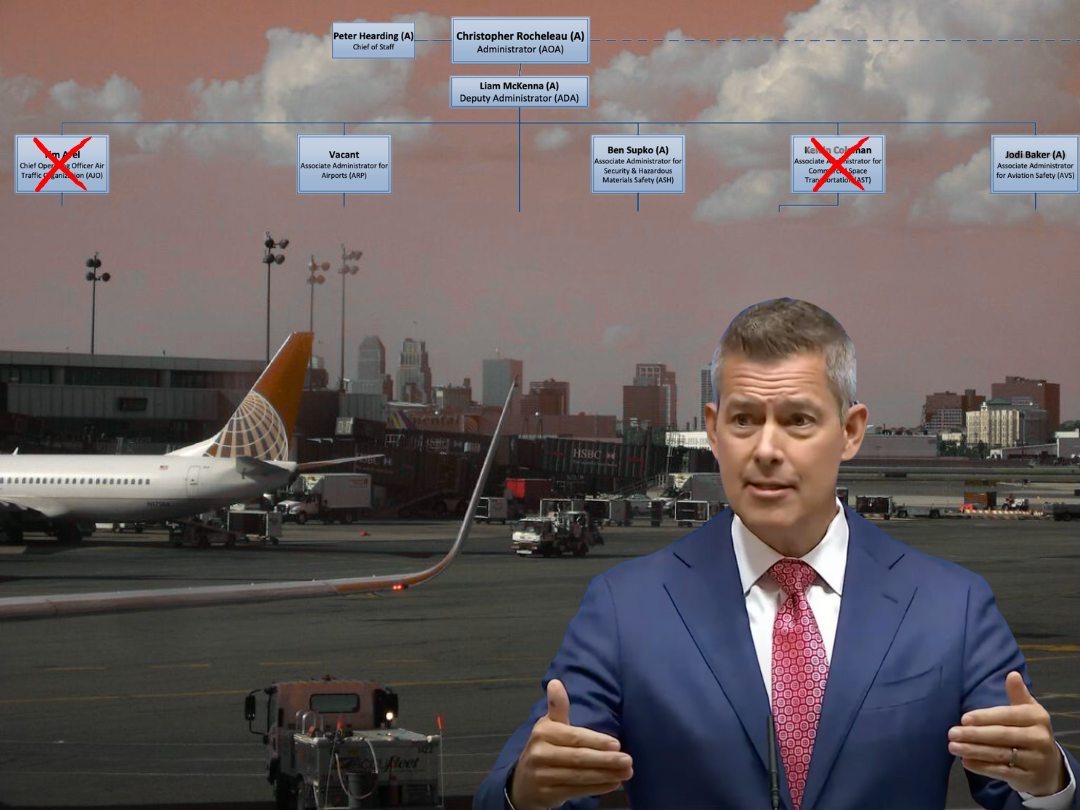Plus, United CEO works with traditional media to scapegoat traumatized Newark workers.
Under the Trump administration, aviation safety is in turmoil, replete with high numbers of resignations, deadly crashes, and, now, air traffic control blackouts at Newark Liberty International Airport. The top brass at the Federal Aviation Administration (FAA), who should be alleviating the dire situation, seem unfit for the moment—filled with acting administrators, vacancies, and two pending early retirements.
Deferred Resignations Ravage The FAA
In early April, the Department of Transportation renewed its deferred resignation offers after the initial round of offers expired in February. Some 4,700 DOT employees accepted the new offer according to Politico. It’s unclear how many of these workers were at the FAA, but given that the FAA houses roughly 80% of the total DOT workforce, it’s likely a significant number, building upon the loss of 700 employees who took the initial buyout. We do know, however, that two top FAA administrators have accepted the offers, further decimating the leadership capacity at the agency amid widespread safety concerns and increased scrutiny following January’s deadly crash at DCA that took 67 lives.
Tim Arel, head of the FAA’s Air Traffic Organization, and Kelvin Coleman, head of Commercial Space Transportation are both reportedly leaving the agency. This will leave the agency without the only two top administrators who were not serving in an Acting capacity. (Trump nominated Republic Airways CEO Bryan Bedford to head the agency on March 17, but his confirmation hearing has yet to be scheduled.)
The Commercial Space Transportation division oversees launches from private companies like Elon Musk’s SpaceX. Coleman’s resignation gives the Trump administration the opportunity to nominate a Musk-approved lackey who can alleviate his long-running complaints with the agency’s regulatory and safety oversight of his debris-raining launches.
United Blames Traumatized Workers Amid Blackouts At Newark
Arel’s resignation is even more concerning—the FAA is in the midst of a decade-long air traffic shortage that came to a head over the past week at the Newark airport (EWR). On April 28, a technical issue caused a radio and communications blackout for air traffic controllers. They were unable to hear or see the flights they were meant to be guiding for 60-90 seconds. (An FAA Associate Administrator for Airports would be well suited to liaise on behalf of the federal government to address potentially fatal technical and infrastructural shortcomings at an airport. Alas, the position remains vacant.)
One can imagine how horrifying such an experience would be for air traffic controllers who are responsible for the safe landings of thousands of people each day. As a result, some controllers took federally permitted trauma leave, leaving the airport further short staffed over that past week plus.
The news has been covering the resulting delays and cancellations over the past two weeks, but the blackout and trauma leave were not revealed until Monday, May 5th. However, while the black out was still unknown to the public, United Airlines decided to get ahead of the backlash to delays by deflecting blame onto air controllers. On May 2, United CEO Scott Kirby issued a statement that its flights were affected by the airport’s “technology issues” that were exacerbated when “over 20% of the FAA controllers for EWR walked off the job.”
This is, frankly, a wildly misleading and offensive description of FAA employees taking time off to process a traumatic event. It’s simply inaccurate to call trauma leave a “walk out”—a term that implies an organized labor protest. But, several news networks, including CNN, CNBC, and the New York Times, quoted United’s characterization without confirmation from the air traffic controllers union, which has since disputed United’s description (and presumably would loudly publicize a major labor action like a walk out in the first place.)
It’s unconscionable, though perhaps unexpected, that traumatized federal employees were scapegoated by an airline CEO, but news organizations should be far more discerning than to parrot corporate PR in the midst of a crisis.
The blackout and resulting staff shortage also spotlight the need for the government to have resilient capacity, even though redundancy gives an appearance of inefficiency. When you pursue “government efficiency” at the expense of backup capacity, the government is unable to perform as needed in times of crisis. Blame then unfairly falls on an understaffed federal workforce, rather the leaders who should have ensured the government was prepared for the worst case scenario. Unfortunately, the air traffic controllers seemingly cannot rely on the dwindling leadership atop the FAA and DOT to defend or advocate for them.
Unfit Leadership in a Time of Crisis
The administration doesn’t seem poised to fix Newark’s problems anytime soon—in fact, another 90-second blackout occurred on May 9th, followed by a failure of Newark’s backup system on Sunday, causing a 45 minute ground stoppage.
Rather than take responsibility and decisive action, Secretary Duffy has deflected blame. “Over the last four years, the last administration, they knew this was a problem. […] During COVID, when people weren’t flying, that was the perfect time to fix these problems,” Duffy said in a Monday press conference discussing Newark’s issues.
This is, of course, an absurd attempt by a panicked administration to avoid scrutiny of its assault on the federal workers that maintain air safety and failure to quickly alleviate potentially fatal problems at Newark. Duffy surely knows that his current boss was president when air travel halted during COVID. He knows the Biden administration passed an infrastructure bill that included “$25 billion to modernize and upgrade airports and air traffic facilities.” His tenure, in contrast, has been marred by terminations, widespread resignations, and multiple commercial crashes in just a few months. As we’ve highlight in our Aviation Disasters Tracker, it’s already had deadly consequences.
Under Trump and Duffy’s leadership, the agency that keeps air travelers safe is in chaos. With air traffic blackouts becoming a repeat occurrence, and leadership unable to step up to the moment, it likely won’t be long before Americans suffer another preventable disaster.

